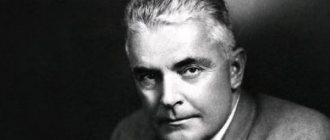What is SOPHISTICS - definition, meaning in simple words.
In simple words, Sophistry is a philosophical movement that originated in Ancient Greece, the creators of which put forward a number of theses, including the relativity of truth and knowledge:
“Man is the measure of the essence of everything (Protagoras)”
It follows from this that knowledge is relative. Accordingly, the conclusion is: objective truth also does not exist, and thus it is possible to prove today that it is, for example, white, and tomorrow it is black. In this case, the main thing is the apparatus of evidence, the ability to use it both cleverly and cunningly to conduct polemics. Actually, the essence of Sophistry fits into these few postulates of their philosophical school.
The carelessness of the sophists in relation to their scientific heritage led to the fact that nothing of what they wrote has survived and we can only evaluate their work using the works of critics - Plato and Aristotle.
What is Sophistry? The definition is speculation based on deliberate violations of laws, as well as the rules of formal logic, substitution of “pure” argumentation with false evidence. In their reasoning, the sophists did not shy away from verbal tricks and allegories, the polysemy of concepts; they resorted to substituting meanings, confusing concepts, and deliberately made various logical errors and deliberately incorrect premises. Such a completely incorrect, from the point of view of logic, mental construction, deliberately presented as correct and looking like correct, is sophism , and perverted incorrectness is the essence of sophism. Many of the sophisms are skillfully crafted paradoxes of logic.
What was said above is said correctly. But this is, rather, a modern, let’s say, vision and sound of sophistry. What she came to, what she became. So how and when did “wisdom” become the sister of demagoguery?
School of Sophists. Representatives
The most prominent representatives of sophistry are:
Prootagoras (far right), fragment of a painting by Salvator Rosa
- Protagoras of Abdera (from Abdera) is one of the senior sophists, the most prominent representative of the school of sophistry, from among its founders. Itinerant teacher, skeptic and materialist. He owns the thesis: “Man is the measure of all things.” Analysts claim that even Socrates was sometimes afraid to discuss with Protagoras. Died during a shipwreck.
- Gorgias . student of Empedocles. Wandering famous teacher and theorist of eloquence. He is famous for his Olympic speech at the games of 392, in which he called on all those present to fight the barbarians.
More details about the activities of these persons can be found in Plato’s dialogues “Protagoras” and “Gorgias”. By the way, it is from such works of Plato as “Apology of Socrates”, “Symposium”, “Republic”, “Meno”, “Sophist” that one can derive the assumption that the Sophists extremely disliked, but feared and respected the outstanding “Lone Philosophers” such as Socrates as well. Because many young men preferred to learn intelligence from people like Socrates. The Sophists opposed their teaching to the teaching of Socrates, and Socrates himself constituted extremely strong competition with the current and teachings of the Sophists.
Researchers of ancient philosophy classify the era of the sophists into three periods:
- The classical period dates from the beginning of the 5th to the first half of the 4th centuries. Representatives, the so-called senior sophists: Protagoras, Gorgias, Hippias, Prodicus, etc.
- Second period – II – beginning of the III century AD.
- Third period – III – ΙV century AD.
“Brilliance and Poverty” Sophistry.
Athens. Five hundred years BC. And two and a half thousand years between us. The achievements of civilization during this time are impressive. In fact, those who lived then are in no way inferior to us, either in intelligence or in development. The ancient Renaissance is in full bloom. Thoughts that are so many years old still fascinate us today.
At this time of grace, another school of philosophy joined the ranks of others. They called themselves sophists. School and school - the Greeks had plenty of them: Cynics, Stoics, Platonists. The Sophists were subjectivists and relativists. That is, if their opponents argued that there is an absolute truth that can be reached through knowledge, then sophistry stood for the relativity (relativism) of everything, they say, knowledge is relative, and objective truth, it turns out, does not exist at all. And that’s all, at that moment no one had yet compromised themselves with false logic. Vice versa.
Sophists somehow became very fashionable in Athenian society. They began to be hired in rich houses for a lot of money to teach young people smarts. It was stipulated that the sophist teacher must teach his student the art of defending his point of view in any field of future life: socio-political, military, in trade affairs.
Systematicity in studying and mastering general knowledge was completely absent among sophist teachers. It was considered very important to teach the ward to use knowledge in public debates, for which various forms of eloquence were studied, especially rhetoric.
Developing rhetoric, we distinguished from sophistry:
- dialectics - methods of honest dispute;
- eristics is the teaching of how to win polemics at any cost.
Here it is, this turning point, when the attitude towards sophistry begins to change its sign from plus to minus! To top it off, the elder of the sophists, Protagoras, lays down the tradition of verbal duels, and in them the sophists often use logical paradoxes and other tricks.
At first, the sophists taught honest argumentation, and along the way they made a number of discoveries in the field of language and logic, systematized the rules of logical thinking, and methods of inference. However, having gotten bored, apparently in alliance with strict logic, they found themselves a newer toy and began creating semantic traps, making full use of such sophistry techniques as substitution of concepts, external similarity of different phenomena, synonyms, antonyms, homonyms and others.
Instead of refuted tricks, that is, sophistry, it was necessary to invent new ones. Their construction seemed to obey the rules of rhetoric and logic, but deliberately violated all the rules of ordinary “correct” logic. The logic of sophisms was also called logic, the logic of the “apparent”.
The inglorious decline of sophistry was natural and predetermined. The worst thing that could happen happened to them: they began to laugh and ridicule the sophists. The sophists were presented as pompous, cynical and greedy ignoramuses: impostor teachers played their role here, rushing en masse at the smell of profit, “promising to teach everyone everything quickly and inexpensively.” The Sophists were dumped in the same dung heap with them.
And after all, it’s not for nothing. Intellectual falsification is by no means an innocent game of the mind. Its reverse side, as the sophists themselves admit: “to present the worst evidence with the best” for one’s own benefit and, with the help of verbal balancing act, win, say, a trial. Definitely beyond morality.
The methods and techniques of sophistry were readily adopted by later demagogy, which also neglected morality in order to achieve its goals.
Sophistry in philosophy.
What is sophistry in philosophy? To answer this question, one needs neither more nor less than to trace the role of sophistry in the history of the development of human thought. And not in its specific manifestations, but indirect influence. Figuratively speaking, it can be compared to explosives placed when digging a road in the rocks. Since it was noted that the next radical shift in philosophy and new thinking was preceded by a return to sophistry .
The European way of thought was born on sophisms and then on their criticism. Thomas Hobbes, Rene Descartes, Immanuel Kant, Hegel, Berkeley, and Hume drew from this source.
Thus, even in modern conditions, sophistry is an extremely valuable worker, creating the prerequisites for critical developments of the European way of thinking. In the general process of cognition, sophistry rightfully took its earned place - the element that forms the Problem.
Paradox and aporia
Aporia (derived from the Greek word: ἀπορία - difficulty, hopeless situation) is always fictitious unsolvable situations.
In such situations, our knowledge based on our experience collides with the knowledge we gain when we analyze the situation. Aporias are used in logic and rhetoric.
While a paradox describes situations that can happen in reality.
Examples of logical aporias
The most famous philosopher whose name is associated with aporia was the ancient Greek philosopher Zeno of Elea. “Achilles and the Tortoise” is one of Zeno’s aporias.
Aporia "Achilles and the Tortoise"
According to this aporia, Achilles will not catch up with the tortoise if the tortoise starts moving while in front of Achilles.
As long as Achilles covers the distance that the turtle crawled, it will move further and further.
While Achilles takes, say, 10 steps, the tortoise manages to crawl 9 steps. Achilles takes 9 steps, the tortoise takes 8. And so on ad infinitum.
Examples of aporia in rhetoric
In rhetoric, aporia is an intentional statement that expresses doubt or question. Typically, aporia is used in the form of a rhetorical question.
This method is used to mislead the interlocutor: they say that you are not aware or do not know the answer to the question.
“Isn’t it a pleasure,” said Candide, “to criticize everything and find faults where others see nothing but beauty?”* Voltaire “Candide, or optimism” * Translation of the original: “But there is not a pleasure,” said Candide “in criticizing everything, in pointing out faults where others see nothing but beauties?”
Sophistry (sophisms) – examples:
- female logic is a chain of thoughts between which there is no logical connection;
- we take an insect (can be a cockroach), tear off its paw, and say: “Crawl!” - he crawls. We tear off the second one and say: “Crawl!” - crawling. We tear off all the paws, give the command - it won’t crawl. Conclusion: with the loss of legs, hearing is lost;
- what you did not lose, you have. You haven’t lost your trunk, it follows that you have a trunk;
- the glass is half full and the glass is half empty. What is so, what is so - exactly the same. If the halves are equal, therefore the wholes are equal. This means that a full glass is identical to an empty one.
A distinction must be made between paradoxes and sophistry, since they do not mean the same thing. A paradox is a word form or reasoning that can be proven to be both true and false at the same time. It comes in two types:
- aporia - a conclusion that contradicts experience;
- antinomy - the presence of two mutually exclusive judgments, each of which is individually true.









